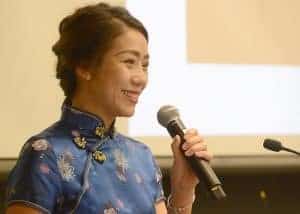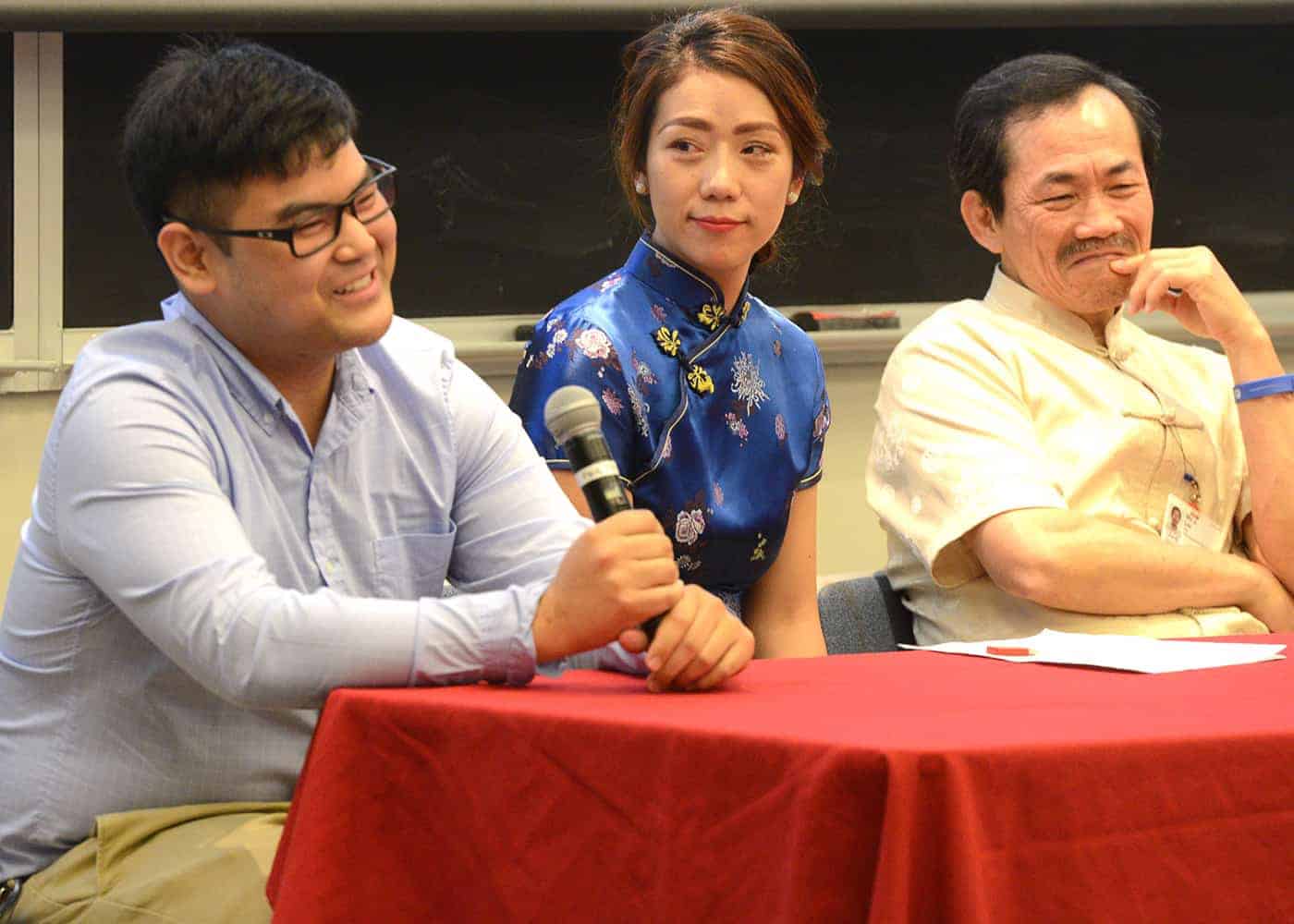UAMS Celebrates Asian, Pacific Islander Heritage
| May 16, 2018 | Everyone has an answer to the question of how they ended up at UAMS. Faculty, staff and students heard four unique perspectives May 2 at an event honoring Asian-Americans and Pacific Islanders.
The lunchtime symposium, sponsored by the UAMS Center for Diversity Affairs and the Chancellor’s Diversity and Inclusion Committee, brought together a College of Pharmacy professor, a College of Medicine assistant professor and a UAMS nurse from China, and an Asian-American medical student with a Filipino background to discuss their journeys to Arkansas and UAMS.
It was part of UAMS’ celebration of Asian Pacific American Heritage Month, recognized in May.
Shi J. Liu, Ph.D., professor in the College of Pharmacy’s Department of Pharmaceutical Sciences, shared that his parents were from Canton, China, and his hometown, Kaohsiung, Taiwan, is a sister city of Little Rock. Liu, who said his friends call him Jesse, said although his hometown is in Taiwan, he is Chinese.
“I am Chinese, not Taiwanese,” he said. “I am Chinese and from Taiwan, just like there are Americans from New York or Arkansas.”
Liu, who completed two degrees in Taiwan before coming to the U.S. to complete his doctorate at Duke University and eventually end up at UAMS, encouraged the audience to never stop learning in life.
“Acquire as much as you can,” said Liu.
Yinyan Wu, R.N., a medical oncology nurse at UAMS, said her parents instilled in her a similar reverence for education that Liu mentioned.

Yinyan Wu, a nurse at UAMS, shared her journey from China and how she ultimately ended up in Arkansas.
Working-class farmers from Hunai, they told her an education could provide a better life for her. She came to the U.S. so her husband could complete a postdoctoral program. She stayed home to care for their two children.
When her husband finished his first postdoctorate, the family moved to Indiana for his second postdoctoral program. There, she began nursing school. The family was forced to live apart the last year of her nursing program when her husband accepted a job in Pine Bluff.
He and the couple’s son moved back to Arkansas, while she and her daughter remained in Indiana. Wu said it was the hardest year of her life. Her alarm was set for midnight every night. She would wake up and study for multiple hours, more if there was a test the next day. All the while, half of her family was hundreds of miles away in Arkansas.
The story has a happy ending, though. Once she finished school, she and her daughter rejoined the rest of the family in Pine Bluff. She’s been at UAMS since 2017.
“I’m very happy to be here and working at UAMS,” said Wu. “Never stop learning, never give up on your dreams and always work hard.”
It was hard for Jia Liu, Ph.D, an assistant professor in the College of Medicine’s Department of Microbiology and Immunology, an only child from Tianjin, China, to leave her family for the U.S., but ultimately she did to follow her dreams.
Still, she said she’s not forgotten her ancestry or the people who allowed her to become who she is today.
“I am still me and proud to be Chinese,” she said. “It is still at the root of who I am.”
Michael Occidental, a second-year UAMS medical student, went through a period when he resented his culture because of his treatment in school.
Occidental’s parents came to the U.S. from the Philippines. His mother, a nurse, came first to Jersey City, New Jersey, and then his father, an anesthesiologist, a year later.
To practice in America, his father required a certification, which meant he had to complete a multi-year residency. It sent him to Mississippi for several years, early in Occidental’s life.
“Starting out, we didn’t have much,” he said. “We lived in a small house, and my mom worked multiple jobs.”
In school, Occidental said he was just “another face in the crowd,” as the area he and his mother lived in, just minutes from New York City, had a vibrant Asian presence and culture.
When his dad got a job at UAMS and the entire family moved to Arkansas, Occidental said he experienced “a culture shock.”
“I went from a face in the crowd to the only Asian child in the school,” he said. “Kids can be vicious, too, with people who are different. I got picked on a lot for being who I was.”
Occidental said it caused him to resent his culture for years. That was until he went to college and was able to meet other Asian-American students with similar experiences.
“It allowed me to become secure with my heritage and find my place in society,” he said.
Occidental’s story sparked interest between him and Billy Thomas, M.D., M.P.H., vice chancellor for diversity and inclusion and director of the Center for Diversity Affairs, in starting an awareness group for Asian students at UAMS.
